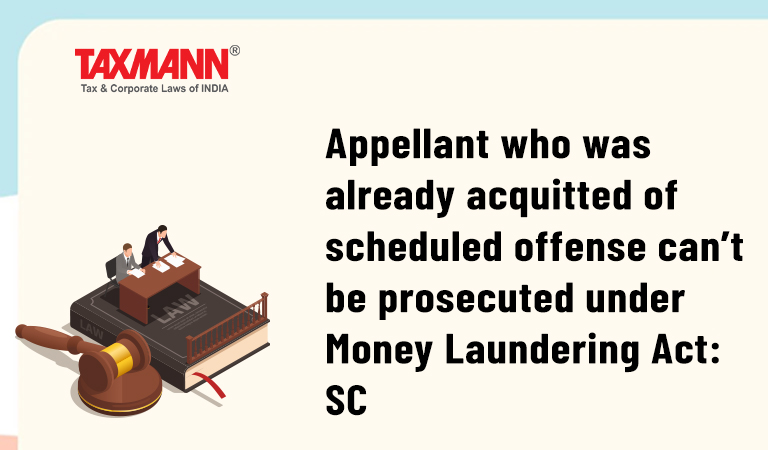Appellant who was already acquitted of scheduled offense can’t be prosecuted under Money Laundering Act: SC
- Blog|News|FEMA & Banking|
- 2 Min Read
- By Taxmann
- |
- Last Updated on 29 October, 2022

Case Details: PARVATHI KOLLUR v. STATE BY DIRECTORATE OF ENFORCEMENT - [2022] 143 taxmann.com 101 (SC)
Judiciary and Counsel Details
-
- Dinesh Maheshwari & Krishna Murari, JJ.
- Manoj Pandey, Adv. & Saurabh Trivedi, AOR for the Petitioner.
- Tushar Mehta, Ld. SG, S.V. Raju, Ld. ASG, M.K. Maroria, AOR, Kanu Agarwal, Zoheb Hussain & Annam Venkatesh, Advs. for the Respondent.
Facts of the Case
In the instant case, the appellants were the wife and son of the accused against whom the Lokayukta Police registered a case u/s 13(1)(e) read with section 13(2) of the Prevention of Corruption Act. During the pendency of the trial, the Directorate of Enforcement (ED) registered a case against the accused and the appellants under the PMLA and filed a complaint before the Special Court for the trial of the offence u/s 3 of the PMLA.
Subsequently, the Lokayukta acquitted the accused of the offences observing that the evidences were insufficient to hold him guilty. Then, the accused as also the present appellants moved an application under section 277 of the Code of Criminal Procedure, 1973 seeking discharge in the case pertaining to the PMLA. Before the said application was considered and decided, the accused expired.
Thereafter, the Trial Court allowed the application and discharged the appellants from the offences pertaining to the PMLA while observing that occurrence of a scheduled offences was the basic condition for giving rise to ‘proceeds of crime’; and commission of scheduled offence was a pre-condition for proceeding under the PMLA.
Aggrieved by the said discharge order, the ED preferred a revision petition before the High Court. The High Court proceeded to set aside the discharge order while observing that the allegations made in the complaint and the material produced, prima facie, made out sufficient ground for proceeding against the appellants for offences under PMLA. Subsequently, an appeal was preferred to the Supreme Court against the order passed by the High Court.
Supreme Court Held
The Supreme Court held that since, the accused had already been acquitted in relation to the scheduled offence and the appellants were not accused of any scheduled offence, the High Court was not right in setting aside the discharge order.
In view of the above, the impugned order passed by the High Court was to be set aside and discharge of application of the appellants was to be allowed.
List of Cases Reviewed
-
- State By Directorate of Enforcement v. Smt. Parvathi Kollur [2022] 143 taxmann.com 100 (Kar.) (para 10) reversed. [See Annex].
List of Cases Referred to
-
- Vijay Madanlal Choudhary v. Union of India [2022] 140 taxmann.com 610 (SC) (para 7).
Disclaimer: The content/information published on the website is only for general information of the user and shall not be construed as legal advice. While the Taxmann has exercised reasonable efforts to ensure the veracity of information/content published, Taxmann shall be under no liability in any manner whatsoever for incorrect information, if any.

Taxmann Publications has a dedicated in-house Research & Editorial Team. This team consists of a team of Chartered Accountants, Company Secretaries, and Lawyers. This team works under the guidance and supervision of editor-in-chief Mr Rakesh Bhargava.
The Research and Editorial Team is responsible for developing reliable and accurate content for the readers. The team follows the six-sigma approach to achieve the benchmark of zero error in its publications and research platforms. The team ensures that the following publication guidelines are thoroughly followed while developing the content:
- The statutory material is obtained only from the authorized and reliable sources
- All the latest developments in the judicial and legislative fields are covered
- Prepare the analytical write-ups on current, controversial, and important issues to help the readers to understand the concept and its implications
- Every content published by Taxmann is complete, accurate and lucid
- All evidence-based statements are supported with proper reference to Section, Circular No., Notification No. or citations
- The golden rules of grammar, style and consistency are thoroughly followed
- Font and size that’s easy to read and remain consistent across all imprint and digital publications are applied



 CA | CS | CMA
CA | CS | CMA
